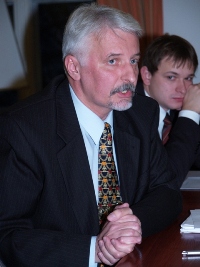Poland's deputy foreign minister accused Russia of showing "psychological problem"
Poland's top negotiator on the planned U.S. missile defense system accused Russia of showing a "psychological problem" in opposing it.

Poland is considering whether to allow the U.S. to place 10 defensive interceptors at a base in northern Poland that would be able to destroy possible missiles from Iran. A radar system in the neighboring Czech Republic would be part of the system.
Russia has voiced fierce opposition to the possible sites in formerly communist eastern European countries, and one general has said the facilities could be targeted.
The Russians "absolutely know that 10 missiles which are not equipped with any kind of warhead cannot do any harm against Russian military might," Witold Waszczykowski, the deputy foreign minister and top Polish negotiator, said in an interview with The Associated Press.
"From a technical point of view, we cannot convince them. They ignore, they neglect, our arguments, and they are saying that any kind of a military installation on the territory of Poland, Czech Republic _ that means on the territory of new member NATO states is not acceptable for them," Waszczykowski said.
"That means they have a psychological problem, a kind of mental problem, to understand that these countries that joined NATO eight years ago, in 1999, are really sovereign, are not part of Soviet or Russian domination any more."
Waszczykowski said that, when Bush visits Poland on June 8, he should give the Poles some "political feedback" on how seriously to take the threat, and address what the U.S. can do to protect Poland from any Russian retaliation.
He said Warsaw fears the Russians will react by building up their forces and placing weapons on the Polish border either in their exclave of Kaliningrad, which borders Poland, or in Belarus, a strong Russian ally.
"If we are confronted with such rhetoric from Russia, should we talk about additional protection for the base?" he asked.
"Should we discuss some additional measures like reinforcement of NATO planning, maybe, or some kind of American declarations? What happens in case of troubles? We would like to hear from President Bush, of course, what are the answers for this kind of changing attitude of Russia."
In February, a top Russian officer, Gen. Nikolai Solovtsov said that, if the Polish and Czech governments go ahead with hosting the sites, "the Strategic Missile Forces will be capable of targeting these facilities if a relevant decision is made."
Waszczykowski held talks last week in Warsaw with John Rood, U.S. assistant secretary of state for international security and nonproliferation.
Neither man divulged many specifics of the talks, but said they were going well and that a next round would be held in Washington in late June. Waszczykowski said a deal could come in early fall.
However, one topic addressed was Polish concern over Russia's stance.
"We are wondering and we actually asked Americans during this discussion how they evaluate the situation, if they think it's only rhetoric for the domestic politics of Russia, or if it is a kind of rhetoric we need to consider, and face and provide some answers," Waszczykowski said.
"No one knows ... how to understand Putin's speech ... how to understand the whole climate, the atmosphere created in Russia."
Subscribe to Pravda.Ru Telegram channel, Facebook, RSS!


